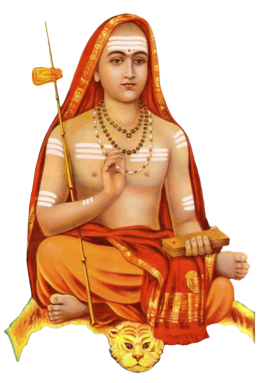छेत्तुं न शक्यो न च कर्मकोटिभिः ।
विवेकविज्ञानमहासिना विना
धातुः प्रसादेन शितेन मञ्जुना ॥ १४७ ॥
chettuṃ na śakyo na ca karmakoṭibhiḥ |
vivekavijñānamahāsinā vinā
dhātuḥ prasādena śitena mañjunā || 147 ||
Grace……Paramatman—An echo of Katha Upanishad I. ii. 20. The Sruti has also a different reading—“dhātuprasādāt”—which means ‘through the purity of the mind and organs etc.’—This meaning is also suggested here.
निष्ठा तयैवात्मविशुद्धिरस्य ।
विशुद्धबुद्धेः परमात्मवेदनं
तेनैव संसारसमूलनाशः ॥ १४८ ॥
niṣṭhā tayaivātmaviśuddhirasya |
viśuddhabuddheḥ paramātmavedanaṃ
tenaiva saṃsārasamūlanāśaḥ || 148 ||
Its root—Ignorance.
निजशक्तिसमुत्पन्नैः शैवालपटलैरिवाम्बु वापीस्थम् ॥ १४९ ॥
nijaśaktisamutpannaiḥ śaivālapaṭalairivāmbu vāpīstham || 149 ||
They are called sheaths as they are coverings over the Atman which manifests Itself through them. From the Annamaya to the Anandamaya the sheaths are gradually finer and finer. Knowledge consists in going beyond them all by means of regulated practice and coming face to face, as it were, with the Atman.
तृष्णासन्तापहरं सद्यः सौख्यप्रदं परं पुंसः ॥ १५0 ॥
tṛṣṇāsantāpaharaṃ sadyaḥ saukhyapradaṃ paraṃ puṃsaḥ || 150 ||
नित्यानन्दैकरसः प्रत्यग्रूपः परः स्वयंज्योतिः ॥ १५१ ॥
nityānandaikarasaḥ pratyagrūpaḥ paraḥ svayaṃjyotiḥ || 151 ||
Indwelling—dwelling within the heart of all.
तेनैवानन्दी भवति स्वं विज्ञाय सच्चिदानन्दम् ॥ १५२ ॥
tenaivānandī bhavati svaṃ vijñāya saccidānandam || 152 ||
प्रत्यञ्चमात्मानमसङ्गमक्रियम् ।
विविच्य तत्र प्रविलाप्य सर्वं
तदात्मना तिष्ठति यः स मुक्तः ॥ १५३ ॥
pratyañcamātmānamasaṅgamakriyam |
vivicya tatra pravilāpya sarvaṃ
tadātmanā tiṣṭhati yaḥ sa muktaḥ || 153 ||
Inactive—the Witness of all activity
A stalk of grass .—Compare Katha Upanishad, II. iii. 17.
Merging .—Knowing that only the Atman manifests Itself through name and form.
Vivekachudamani – Introduction
1: Devoted Dedication
2: Glory of Spiritual Life
3: Unique Graces in Life
4-7: Miseries of The Unspiritual Man
8-13: Means of Wisdom
14-17: The Fit Student
18-30: The Four Qualifications
31: Bhakti – Firm and Deep
32-40: Courtesy of Approach and Questioning
41-47: Loving Advice of the Guru
48-49: Questions of the Disciple
50: Intelligent Disciple – Appreciated
51-55: Glory of Self-Effort
56-61: Knowledge of the Self-Its Beauty
62-66: Direct Experience – Liberation
67-71: Discussion on Questions Raised
72-75: Gross Body
76-82: Sense Objects a Trap – Man Bound
83-86: Fascination for Body Criticised
87-91: Gross Body Condemned
92: Organs of Perception and Action
93-94: Inner Instruments
95: The Five Pranas
96-101: Subtle Body – Effects
102: Functions of Prāna
103-105: Ego Discussed
106-107: Infinite Love – the Self
108-110: Māyā – Pointed Out
111-112: Rajoguņa – Nature and Effects
113-116: Tamoguņa – Nature and Effects
117-119: Sattvaguņa – Nature and Effects
120-121: The Causal Body – Its Nature
122-123: Not-Self – Description
124-135: The Self – Its Nature
136: Advice for Self-control
137-142: What is Bondage – The Reply
143-144: The Powers – Agitation and Veiling
145-146: Bondage in Action
147-153: Ātman and Anātman – Discrimination
Negation of the Kośas
154-164: – Annamaya kośa (Food sheath)
165-166: – Prņamaya kośa (Vital air sheath)
167-183: – Manomaya kosa (Mental sheath)
184-188: – Vijnanamaya kośa (Intellectual sheath)
189-191: Ātman – Unattached
192-193: What is Liberation? – Disciple
194-206: Self-Knowledge gives Liberation
207-210: Anandamaya kośa (Bliss sheath)
211: Ātman – Other than the Five Kośas
212: What is Ātman? – Disciple
213-225: Nature of the Self – Discussion
226-236: All Manifestation Absolute
237-240: Brahman – Its Nature
241-249: That Thou Art – Explanation
250-253: Attitude in Meditation
254-266: Aids to Meditation
267-276: Give up Vāsanās – the Method
277-292: End Superimposition – The Means
293-297: The Perceived I’ Factor – False
298-309: Condemnation of the Ego
310-319: Actions, Thoughts and Vāsanās – Renounce
320-329: Total Vigilance – Its Price
330-338: In the One, No Plurality
339-348: Spiritual Growth – the Secret
349-353: Cause-Effect – False
354-372: Samadhi – Its Nature
373-378: Fully Detached – Samadhi Easy
379-383: Meditation – the Technique
384-397: Continuous Attention to Self
398-406: No Diversity in Reality
407-413: Ātma-vicāra – Contemplation
414-418: Give up Perceptions
419-425: The Science of Reality – Its Benefits
426-445: Signs of a Realised Seer
446-464: Prārabdha for a Saint
465-471: There is No Plurality
472-479: Experience of Selfhood
480-520: Practice of Knowledge – Disciple
521-575: Final Words of Advice
576-578: Blessed Disciple Liberated
579-581: The Glory of the Textbook

Vivekachudamani – Verses 147-153 – Vivekachudamani Verses 147-153 – By Adi Sankaracharya – In Sanskrit with English Meaning, Transliteration, Translation, Commenary, Lyrics, Audio – Vivekachudamani-147-153
